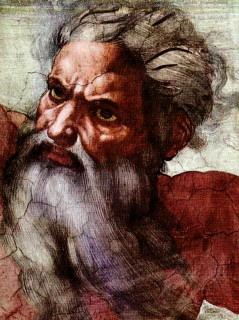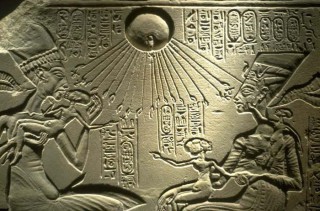
The God of the Old Testament is arguably the most unpleasant character in all fiction: jealous and proud of it, a petty, unjust, unforgiving control-freak, a vindictive, bloodthirsty ethnic cleanser, a misogynistic, homophobic, racist, infanticidal, genocidal, filicidal, pestilential, megalomaniacal, sadomasochistic, capriciously malevolent bully.
How jealous and proud is he? Well, his name is Jealous. And he named himself!
For thou shalt worship no other god: for the LORD, whose name is Jealous, is a jealous God: Exodus 34:14
That was the description of the Hebrew bible god by the renowned biologist Prof. Richard Dawkins.
What on earth urged such an outstanding scientific figure as Prof. Dawkins, in his discussion of the God hypothesis, to say those things about the god of the Old Testament? He is not known for being irrational or cynical, though he is the most famous atheist in the world, but he made that statement merely out of being objective and logical.
The Bible describes Yahweh as the one true God who delivered Israel from Egypt and gave the Ten Commandments: “Then God spoke all these words. He said, ‘I am Yahweh your God who brought you out of Egypt, where you lived as slaves. You shall have no other gods to rival me. Notice the mentioning and the jealousy of Egypt`s power and pantheon of gods.
Since Judaism gave the world monotheism, one would expect – from a historical point of view – that ancient Jews and their priests must have embarked upon a long and enduring religious quest for the one god concept. But on the contrary, one gets to find out and surprisingly that it was God who made the abrupt introduction to the Jews.
Many secular philosophers and even some theologians argue that monotheism evolved from polytheism saying that “Polytheistic faiths were more primitive and monotheistic faiths more advanced – culturally, ethically, and philosophically.” According to those theologians, if polytheism came from monotheism, it must have de-evolved. It could not have evolved.
But what if monotheism came from a culture that is ethically and philosophically primitive in every way. What then are the chances for a religious evolution – if any – of a universal god and ethical monotheism?
In other words, one can not appreciate the complexity and the sophistication of a modern Porsche car, unless he bears in mind and previsualize the complex and evolutionary phases man had to go through from riding a donkey to hopping over a motor cycle and finally driving a four wheel car.
The same thing should apply when we discuss monotheism, for it is the finest and most abstract concept in religious thinking. The ancient Egyptians reached monotheism after almost two millennia of profound religious evolvement.
We can’t not jump from paganism right into monotheism without transitional phases; this is not logical, and furthermore historically refuted. Nonetheless, and weird enough, this is what we get when we tried to approach the evolution of monotheism in Judaism.
The Hebrews described in the Old Testament appear to have been semi-nomadic herders of sheep and goats and occasional farmers, without knowledge – unlike the Egyptians nor the Assyrians – of metal working, sophisticated craftsmanship or a written language. Like other nomadic herders, they were tent dwellers — as Abraham is described in Genesis 13:3. And, as was common among herders, the Hebrews had a masculine god of the sky and weather. The Hebrews organized themselves around their extended families, and Hebrew families were combined into kinship groups governed by a council of elders that left the head of a family with a sense of self-rule. These heads of families were males with absolute authority over their wives and children, and they were the priests for their families, each family having its own sacred images.
The Hebrews saw their god of the sky as concerned with them rather than as a god for all peoples. Genesis 15:18 describes their god as making a covenant with Abraham, saying:
To your descendants I have given this land, from the river of Egypt as far as the great river, the river Euphrates.
So this is the kind of monotheism that Judaism gave us. A sort of readymade and evolution free monotheism. A mighty god who cares only for his nomadic people, in a way that wouldn`t qualify him as a universal god but rather as a national or tribal one for that matter.
Yahweh is a Hebrew serving god; his doctrine couldn’t encompass all humans – contrary to the Egyptian God “Aten ” – but only favored his people in an unjustified bias. And looking back at the Jewish herders in those ancient times, tired of wandering after their sheep, envying other powers like the Assyrians or the Egyptians for the land and wealth they had, one can understand their desperate need for a god that would promise them the land and power they lacked .
Was the purpose of all this merely to pluck one tiny nation out of obscurity and elevate it above all others?
To quote Julius Wellhausen ( 1844 -1918), the German biblical scholar and orientalist on the Jewish scriptures:
“Monotheism is worked out to its furthest consequences, and at the same time is enlisted in the service of the narrowest selfishness.”
Ancient cultures as the Sumerian, Babylonian and the Egyptian followed a normal and systematic pattern of evolution in regard to the religious thinking, every civilization commenced with a creator god, a pantheon of lesser gods, an epic of creation of the universe, a mythology rich in highly symbolic tales and may be then and in the due course of time – as the case with the kingdom of Egypt and during the reign of king Akhenaten (1353 BC – 1336 BC) – enjoyed the moment of developing ethical monotheism, and introduced the one god concept, in the form ” Aten ” the sun disc whose rays touched and encompassed all peoples alike.

But that pattern is turned the other way round in the case of the Hebrew monotheism. The Jews started where other nations ended. They began with the one deity concept, and then set out to fit in their tales of the holy patriarchs, and the creation story.
This reversed manner of religious evolution is perplexing to the extent that pushed some scholars to adopt the thesis that considered Aten worship inspired or in some way sparked the development of monotheism later among the ancient Israelites.
And some authors went a bit farther as Daniel lazer, in his critique of the Old Testament, referred to what he saw as chaotic contradictions and commentd as the following..What, after all, was the point of mobilizing such a broad population in this manner?
So that they could slaughter their neighbors all the more thoroughly?
How could Moses prohibit murder and then, in Numbers 31, fly into a rage because a returning Israelite war party has slaughtered only the adult male Midianites? (“Now kill all the boys,” he tells them when he calms down. “And kill every woman who has slept with a man, but save for yourselves every girl who has never slept with a man.”) Was murder a crime only when it involved members of the in-group? Or was it a crime when it involved human beings in general, regardless of nationality? Did an emerging concept of a more equitable social order apply only to Israel or to other nations as well?
In one form or another, these questions have been with us ever since.

Ashraf Ezzat is an Egyptian born in Cairo and based in Alexandria. He graduated from the faculty of Medicine at Alexandria University.
Keen not to be entirely consumed by the medical profession, Dr. Ezzat invests a lot of his time in research and writing. History of the ancient Near East and of Ancient Egypt has long been an area of special interest to him.
In his writings, he approaches ancient history not as some tales from the remote times but as a causative factor in our existing life; and to him, it’s as relevant and vibrant as the current moment.
In his research and writings, Dr. Ezzat is always on a quest trying to find out why the ancient wisdom had been obstructed and ancient spirituality diminished whereas the Judeo-Christian teachings and faith took hold and prospered.
Dr. Ezzat has written extensively in Arabic tackling many issues and topics in the field of Egyptology and comparative religion. He is the author of Egypt knew no Pharaohs nor Israelites.
He writes regularly at many well-known online websites such as Dissident Voice and What Really Happened.
Dr. Ezzat is also an independent filmmaker. His debut film was back in 2011 The Annals of Egypt Revolution and in 2012 he made Tale of Osiris a short animation for children.
In 2013 his short The Pyramids: story of creation was screened at many international film festivals in Europe. And he is working now on his first documentary “Egypt knew no Pharaohs nor Israelites”.
ATTENTION READERS
We See The World From All Sides and Want YOU To Be Fully InformedIn fact, intentional disinformation is a disgraceful scourge in media today. So to assuage any possible errant incorrect information posted herein, we strongly encourage you to seek corroboration from other non-VT sources before forming an educated opinion.
About VT - Policies & Disclosures - Comment Policy



